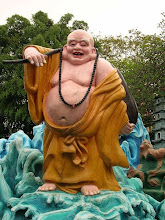in India we have five categories of teachers.
Arihanta
The first category is called the #Arihanta; he’s a teacher and also a master. Being a master means that he has realized what he says. For example, Jesus will be called an Arihanta because whatsoever he says is his own realization. He says, “It is on my own authority.”
Siddha
Arihanta
The first category is called the #Arihanta; he’s a teacher and also a master. Being a master means that he has realized what he says. For example, Jesus will be called an Arihanta because whatsoever he says is his own realization. He says, “It is on my own authority.”
Siddha
The second category is called the #Siddha.
The Siddha is only a master. He has realized but he’s incapable of
communicating it. He cannot say what he has realized; in a way he is
dumb. And there have been many saints in the world who have not spoken
because they cannot manage to bring the beyond within the words. That
too is called a Buddha, a teacher.
Acharya
The third category is called an #Acharya – who is only a teacher but not a master. He knows exactly what he’s teaching, but not on his own authority. The Pope is an Acharya. If Jesus is an Arihanta, then the Pope is an Acharya. He is speaking on the authority of the Bible, not on his own authority.
Ubadhyay
The fourth category is called #Ubadhyay – one who is not even certain of what he says. Perhaps fragments are true. P.D. Ouspensky has written a book on Gurdjieff: In Search of the Miraculous. Its subtitle is “Fragments of an Unknown Teaching”, and he’s very true in writing the subtitle – only fragments, because he could understand only parts of it; parts were beyond him. He’s also called a teacher.
Sadhu
And the fifth is called a #Sadhu. A Sadhu is one who has not achieved but is trying sincerely to achieve. He may be just one foot ahead of you, but he can teach that much. He cannot claim the achievement; he cannot say with certainty that this is so.
English is poor in that way, it has only two words. English is poor in many ways, particularly as far as religion is concerned, but is bound to be so. Eastern languages are poor in scientific terms. So you have only one word, teacher, for everything. You can call me a teacher but to us it means a very lower category.
I am an Arihanta. You can call me a super teacher, because I speak on my own authority. I don’t have to rely on Jesus, or Buddha, or Krishna. What I say, I know. If I don’t know, I don’t say it.
#Osho
Acharya
The third category is called an #Acharya – who is only a teacher but not a master. He knows exactly what he’s teaching, but not on his own authority. The Pope is an Acharya. If Jesus is an Arihanta, then the Pope is an Acharya. He is speaking on the authority of the Bible, not on his own authority.
Ubadhyay
The fourth category is called #Ubadhyay – one who is not even certain of what he says. Perhaps fragments are true. P.D. Ouspensky has written a book on Gurdjieff: In Search of the Miraculous. Its subtitle is “Fragments of an Unknown Teaching”, and he’s very true in writing the subtitle – only fragments, because he could understand only parts of it; parts were beyond him. He’s also called a teacher.
Sadhu
And the fifth is called a #Sadhu. A Sadhu is one who has not achieved but is trying sincerely to achieve. He may be just one foot ahead of you, but he can teach that much. He cannot claim the achievement; he cannot say with certainty that this is so.
English is poor in that way, it has only two words. English is poor in many ways, particularly as far as religion is concerned, but is bound to be so. Eastern languages are poor in scientific terms. So you have only one word, teacher, for everything. You can call me a teacher but to us it means a very lower category.
I am an Arihanta. You can call me a super teacher, because I speak on my own authority. I don’t have to rely on Jesus, or Buddha, or Krishna. What I say, I know. If I don’t know, I don’t say it.
#Osho



























No comments:
Post a Comment